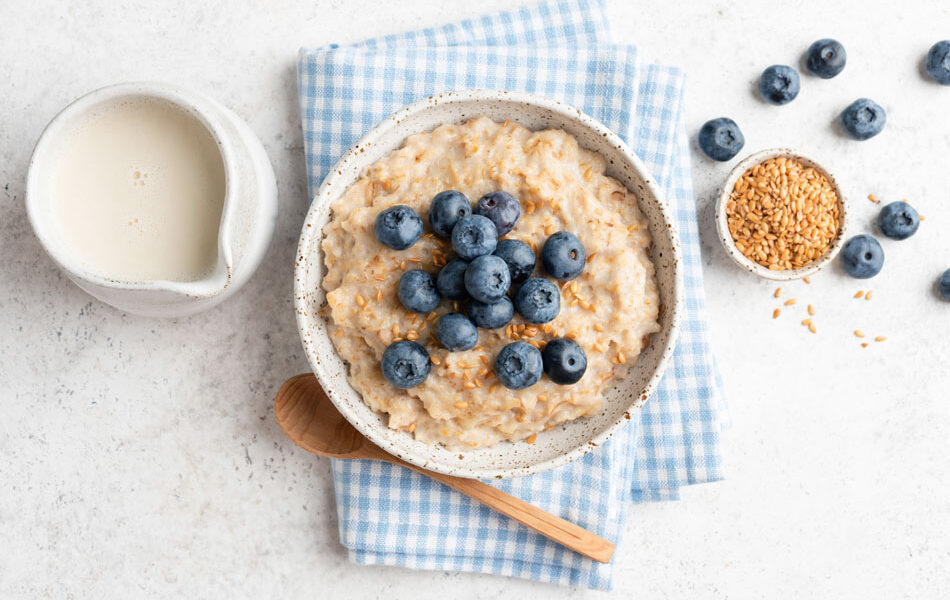Oatmeal for Weight Loss: Nutritional Value and Health Benefits
Oats are high-fiber whole-grain cereal eaten for breakfast daily by many people. In this article, we determine whether oats are good for weight loss and explore the other health benefits of eating oatmeal.

Knowing what to include in your healthy diet plan can be challenging, especially when it comes to carbohydrates. However, oatmeal is frequently promoted as a healthy breakfast option for physical and mental well-being and for those wanting to lose weight.
This article delves into the nutritional value of oats to determine whether regularly eating oatmeal can help with weight loss. We also discuss some of the other benefits for the health and well-being of eating oats and how they can be included in a healthy diet.
Is Oatmeal Good for Weight Loss?
Yes, oatmeal is good for weight loss, provided it is portioned and eaten without too much sugar.
Oats are one of a number of whole grains that can be incorporated into a weight loss diet plan. It is a rich source of fiber and is especially high in soluble fiber, which positively affects blood sugar control.
When you eat oats in combination with protein and fat ingredients such as almond butter or plain yogurt, your blood sugar levels rise slowly, resulting in a moderate insulin response. As a result, you feel satiated for longer, and there is no excess insulin that can cause weight gain.
Therefore, eating oatmeal as part of a healthy diet can make it easier for you to eat fewer calories, and regularly eating oatmeal has positive effects on your digestive tract and general health, too.
Oatmeal Nutritional Value per 100g
Oatmeal is an excellent source of dietary fiber, with half a cup of cooked oats providing 2g of fiber. Most of the fiber in oats is soluble fiber, which is one of the reasons it can be included in a healthy diet.
Oats contain more protein than other whole grains, are low in fat, and 100g of oats provide 11g of carbohydrates. Although oats contain all three macronutrients, it is still high in carbs, and you should add protein and fat to make it a complete meal with a low glycemic index and a good nutritional profile.
| Net Carbs | Total Carbs | Fats | Protein |
| 9.5g | 11.2g | 2.63g | 2.18g |
| Calories | Fiber | Sugars | Glycemic Index |
| 76 | 1.7g | 0.17g | 55 |
How Much Oatmeal Should I Eat to Lose Weight?
Like any other carbohydrate food, it is crucial to consider how much oatmeal you eat. If you eat large portions, your calorie intake will be too high, and you won’t be able to lose weight.
The ideal portion size of oatmeal is half a cup, or 40g (1.4oz), of dry rolled oats or steel-cut oats. It provides a low glycemic index carbohydrate amount of 27g for an average meal.
Is Oatmeal Healthy for Weight Loss?
Yes, oatmeal is healthy for weight loss. Eating oats for breakfast means you are consuming low glycemic index carbohydrates, which are released slowly into your blood, helping regulate your blood sugar and keeping you satiated for longer.
Therefore, regularly eating oatmeal can help with weight loss, and it offers numerous health benefits, too. Eating oatmeal increases your intake of soluble fiber, which has been linked to regular bowel movements, heart disease prevention, and improved blood sugar levels.
Which Oats Are Best for Weight Loss?
When trying to lose weight, rolled oats or steel-cut oats are the best oatmeal options. They have undergone minimal processing, and the fiber is more or less still intact, making your digestive system work harder to release the energy from the carbohydrates.
Instant oatmeal has been highly processed to cook quickly, and flavored oats contain sugar. Both of these types of oats can make weight loss more challenging due to the dramatic rise in blood sugar they may cause.
Benefits of Eating Oatmeal for Weight Loss
There are many benefits of including oatmeal in your diet for weight loss that are attributed to the high fiber content. Regularly eating oats can help keep your bowel movements regular and control your hunger.
#1 Relieves constipation
Oats are rich in fiber, especially soluble fiber, making them one of the foods that are beneficial for relieving constipation. Soluble fiber holds water in the intestine, making the stool softer and your bowel movements easier and more regular.
Regularly eating oats also benefits the bacteria that live in your digestive system. When the friendly bacteria in your gut thrive, they help keep your intestines healthy, prevent constipation, and produce chemicals that have numerous benefits throughout the body, some of which have been linked to weight loss.
#2 Promotes satiety
When you eat oatmeal for breakfast, you are less likely to get hungry soon after eating than if you ate a refined, sugar-laden breakfast cereal or a slice of white toast, for example. The healthy mix of fiber, complex carbs, protein, and fat in oats promotes satiety and makes eating oats a healthy breakfast option for weight loss.
This is due to a slower rise in blood sugar and insulin levels, which is important for weight loss because raised insulin levels can result in excess sugar being stored as fat.
Another consequence of eating meals that cause a spike in insulin is that your blood sugar levels drop just as rapidly as they rise, resulting in low blood sugar and feeling hungry soon after eating, making you more likely to eat too many calories.
#3 Rich in fiber
As a whole grain cereal, oats are a healthy breakfast option that should be included in a weight loss meal plan because of the high fiber content.
Eating oats as part of a healthy diet that also includes other whole grains such as barley and brown rice, fruits like mangoes and blueberries, and vegetables like broccoli helps ensure that you meet your recommended daily fiber intake.
FAQs
When included as part of a healthy, balanced diet, eating oats does not cause weight gain, provided you don’t add too many toppings, and you avoid flavored oats, which may contain too much sugar. Oats are good for weight loss because their macronutrient content helps to control blood sugar and calorie intake.
Rolled oats and steel-cut oats can be eaten daily as a healthy breakfast for those wanting to lose weight. Regularly eating oatmeal has numerous benefits and can help you control your calorie intake due to its satiety value, helping you achieve your weight loss goals.
Many people add sweeteners such as maple syrup, brown sugar, or toppings to their morning oats, including fresh fruits, pumpkin seeds, dates, and almonds. Nuts, seeds, and nut butter are also a great way to add some protein and fat to your bowl of oats.
A Word From a Nutritionist
Half a cup of dry rolled oats or steel-cut oats, cooked with the addition of a nut butter, a drizzle of maple syrup, and diced fresh fruit or dried fruit, is a delicious healthy breakfast.
A bowl of oats in the morning can keep hunger at bay, helping you reduce your calorie intake and lose weight. Although oats on their own are not a complete meal, the toppings you choose to add can improve the nutritional profile of your breakfast.
Flavored instant oatmeal does not have the same nutritional and health benefits as plain unrefined oats, and often contains too much sugar, resulting in raised blood sugar and a substantial insulin response, which can promote weight gain over time.
The fiber content of oats and other whole grains supports the bacteria in your digestive tract and helps manage and prevent constipation. Other benefits of eating oats include support for your immune system, the reduction of bad cholesterol levels, and improved blood glucose control.
Conclusion
Eating oats can be good for weight loss. Its nutritional profile includes complex carbs, a small amount of protein and fat, and a significant amount of dietary fiber.
Therefore, when it is included in a balanced diet, oats can help you achieve your weight loss goals and improve your overall health and well-being.

















































 Select your language:
Select your language: 










